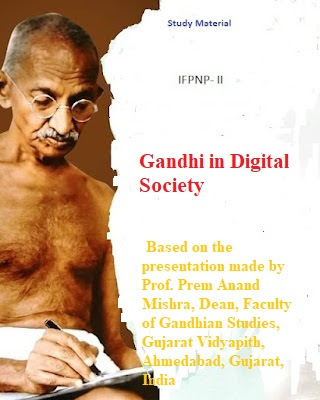Gandhi in Digital Society
Gandhi is physically no more, his ideas are still interpreted and debated among us as they intervene in our existing reality. How does he intervene in the contemporary digital society?
The digital society offers both 'promises ' and 'problems' to us.
On the one hand, it promises us a convenient, comfortable and speedy lifestyle through the digitalization of data that affects all areas of human activities including economy, politics, communication, and healthcare. On the other hand, it has generated complex and unprecedented questions concerning human relations.
In digital society human beings are reduced to a set of digits. At the macro level, our relationship with other institutions is guided and regulated by certain unique fixed digits. For example, for economic relations we have Bank account number, PAN number, ATM, Credit Card, Debit Card no. and so on. For other governmental work, we have Aadhar no., Mobile no. Vehicle no. Passport no. Election Card no. and so on. In short, every individual is a set of digits that one uses for one's specific purpose in daily life. This has generated a height of impersonalization of society where neither any structure nor any individual is in direct contact with the other individual.
In the digital society, micro-level relations or interpersonal relations are being mediated by technology. Facebook and WhatsApp are fine examples of it. Through such a techno-mediation, reality is transformed into 'hyper-reality'- a concept popularised by French Sociologist Jean Boudrilard. Such a techno-mediated relation which is 'hyped', 'unreal' and 'indirect' cannot be the basis of 'true' relationship which every individual wishes. The digital society provides us unrestricted data and information and claims they are knowledge. The perpetual inflow of data and information stops our 'thinking to decide' and we are always 'uncertain' about everything. In short, digital society has made our macro-level relation 'impersonal', micro level relation 'unreliable', and intrapersonal relation 'undecidable'. If it is so, then, what is the meaning of being called ' being human'?
It is here Gandhi's idea of human dignity and individual freedom intervenes. Gandhi argues that the individual is over and above the structure he/she has developed. For him, being human means to be 'disciplined' enough to guard oneself against any technology which sweeps us away. It also means to 'think' clearly what is right and wrong and differentiate between data, information, and knowledge. For him, instead of giving responsibility to other devices to decide our destiny, we need to take 'responsibility' ourselves and come forward boldly. It was his Swaraj or self-rule. Further, instead of living in impersonal, abstract, 'unseen' and non - immediate world we need to physically and mentally live in 'proximity' which is immediate, personal and concrete. It is this space that gives us a sense of being called 'human'. It was, as we are aware, his notion of Swadeshi. Finally, in inter-personal relations, Gandhi would have suggested 'face to face society' than indirect, techno -mediated 'Facebook society'.
In today's WhatsApp culture Gandhi must have pointed out to know 'what is appropriate for us'. He would have informed us that the chat and calls that we make, must be 'open' with no 'encryption', which means one can always read and listen to them. This was his 'open society' based on a moral basis.
Based on the presentation made by Prof. Prem Anand Mishra, Dean, Faculty of Gandhian Studies, Gujarat Vidyapith, Ahmedabad, Gujarat, India




No comments:
Post a Comment